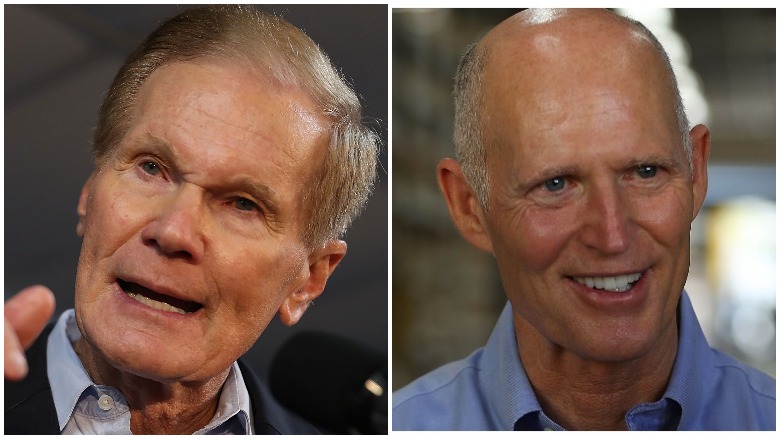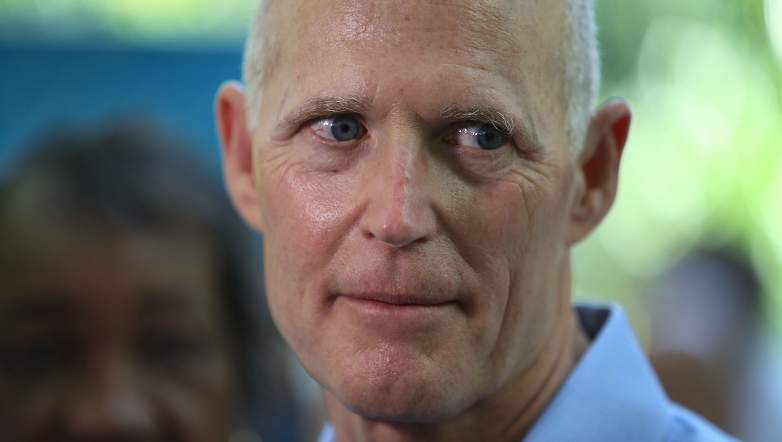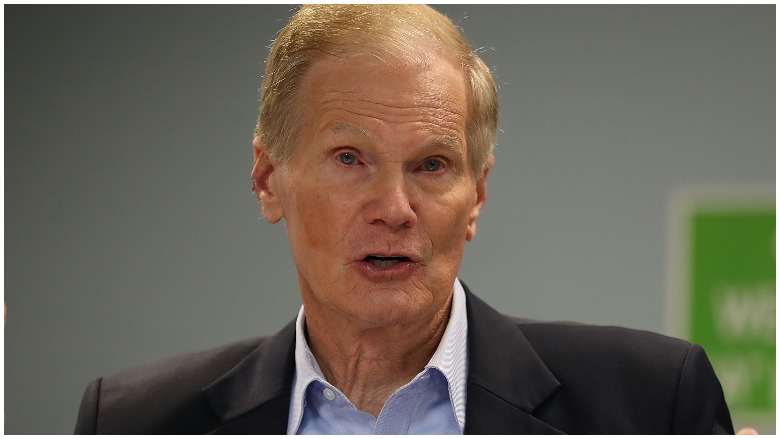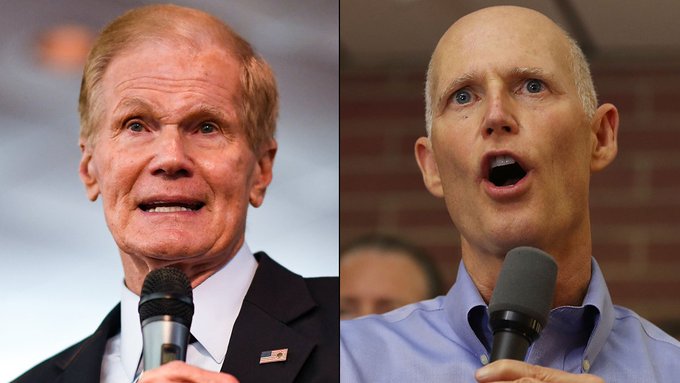
Getty Senator Bill Nelson and Governor Rick Scott.
Scott vs. Nelson for U.S. Senate in Florida was a battle between political heavyweights in the Sunshine State.
Bill Nelson, the Democratic incumbent, and Rick Scott, the Republican governor, were locked in a tight race right to the bitter end, but Scott retained a slim lead by the time the day was over and into the early morning hours of November 7, 2018. However, the election is headed for a recount.
According to NBC Miami, Rick Scott has declared victory in the race but Bill Nelson is not conceding until a recount is completed. A mandatory recount is ignited in Florida in races with a margin of less than 0.5%.
Florida Election Results
With 99 percent in, Scott emerged ahead of Nelson – narrowly. Nelson led early on, but the race tightened dramatically. According to CNN:
Rick Scott: 50.2% 4,081,179
Bill Nelson: 49.8% 4,050,940
(99% in)
You can read the Florida recount rules here. The race was largely pitched as a referendum on President Donald Trump, who rallied voters in the red areas of the state with success. The Republican also narrowly won the Florida governor’s race but by a slightly larger margin that the Senate race and so the Democrat in that race, Andrew Gillum, has conceded.
According to RealClearPolitics, Nelson led in three of the five most recent polls. You can see all polls in the race here. Nelson was ahead in more of them.
In Florida, the polls closed at 7 and at 8 p.m. EST. First voting results were out around 7 p.m. EST for Florida. You can track Florida election results here or here.
Here’s another site to track live Florida election results on November 6, 2018. First Coast News also has live election results for Florida, which you can access here.
You can find the Florida Secretary of State’s election night results here.
Sky high turnout in Florida early voting may have injected some volatility into the race because some pollsters base their methodologies in part on turnout projections. There was a dramatic increase in early voting turnout in 2018 in Florida (and many other states) when compared to 2014.
Nelson vs. Scott: Senator vs. Governor

GettyFlorida Governor Rick Scott in May 2017.
Nelson has served in the U.S. Senate since 2000. He has also served in U.S. Congress, in the state Legislature in Florida, and as state Treasurer, Insurance Commissioner and Fire Marshal. Rick Scott is Florida’s 45th governor and previously ran a healthcare company. Scott has accused Nelson, the state’s only Democratic statewide officeholder, of being a career politician.
In October 2018, RealClearPolitics noted in the Florida Senate race: “Rick Scott’s lead has evaporated as Bill Nelson has begun to spend. The race is still close, but Nelson seems to have at least stabilized the situation when it looked like it might be getting away from him.” The election, along with that for Florida governor, is being closely watched as a possible referendum on President Donald Trump. You can see the latest polling results in the Florida governor’s race here.
The Florida Senate race and the Florida governor’s race are being watched as possible canaries in the mine for the 2020 presidential contest as President Trump won Florida in 2016. Nelson and Scott have clashed over a host of issues, including healthcare and taxes.
Early Voting Turnout Was Up

GettySen. Bill Nelson (D-FL) speaks during a round table meeting with education leaders from South Florida at the United Teachers of Dade Headquarters on August 6, 2018 in Miami, Florida.
More than 5.2 million people had already cast ballots in Florida when election day arrived, a dramatic increase over 2014, and turnout was high in key counties throughout the state as Florida went to the midterm election polls on November 6, 2018.
The early voting numbers were way up over 2014, when 3.1 million people cast early ballots in Florida. Michael McDonald, a professor at the University of Florida, tracks early voting turnout, and his chart indicates the numbers are not only way over 2014 in Florida but also in many other states. You can see his chart here. He told Politico, “This is not a normal election. The best guess is that we’re looking at some sort of hybrid midterm/presidential election” turnout-wise throughout the country.
The Tampa Bay Times reported that Florida was headed for record turnout for a midterm election.
Early voting totals are posted by the Florida Secretary of State’s office. You can also see county-by-county breakdowns here.
2018 General Election Early Voting Statistics for Florida
Election Date – 11/06/2018
Voted Vote-by-Mail
Republican: 1,036,410
Democrat: 973,313
Other: 14,598
No Party Affiliation 467,055
Total 2,491,376
Voted Early
Republican: 1,053,254
Democrat: 1,139,103
Other: 21,899
No Party Affiliation: 506,249
Total: 2,720,505
Vote-by-Mail Provided (Not Yet Returned)
Republican: 318,222
Democrat: 430,111
Other: 6,983
No Party Affiliation: 248,010
Total: 1,003,326
Democrats had a slight edge in early voting numbers.
